一般疑问句肯定及否定回答
- 格式:doc
- 大小:56.00 KB
- 文档页数:4
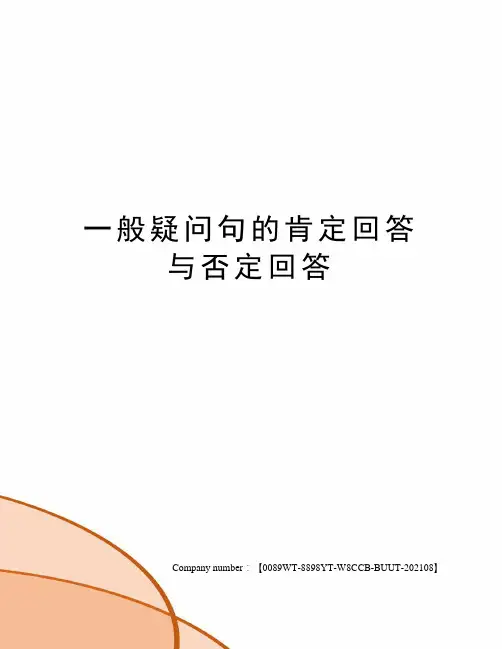
一般疑问句的肯定回答与否定回答Company number:【0089WT-8898YT-W8CCB-BUUT-202108】一般疑问句的肯定回答与否定回答1. 主语一致IsheTomYes,,heisn’t.Aretheygood friendsYes,,theyaren’t.注意①:问句用you,回答改用I或We AreyouJackYes,,I’m not. AreyouChineseYes,,wearen’t. 注意②:问句用this/that或these/those,回答改用it或theyIsthisyour bookYes,,itisn’t.Arethoseyour books Yes,,theyaren’t.练一练Are you GinaAre those his erasersAre you 12 years oldIs she a good teacherAre these his books含be动词的句子变疑问和否定句变法Be动词包含:am is are 否定句:eg:It is a goat. It is not a goat.You are a teacher. You are not a teacher.总结:含be动词的句子改否定句就是在be动词后面加not疑问句:1一般情况把be动词提前,其余成分照抄2句子中出现I am 或We are 是将它们改成Are you其余成分照抄3句子中出现My 或our时,先将句子改成一般疑问句再将my或our变成your一、将下列句子改为一般疑问句1、This is my handbag.2、That is his pencil.3、It is his house .4、This is your car.5、That is her pen.二、看下列句子做肯定回答和否定回答1、Is this his book2、Is that your watch3、Is it a skirt4、Is he a teacher5、Are you happy三、将下列句子改为否定句1、This is my shirt.2、That is your car.3、He is a doctor.4、It is her dog.5、We are Chinese.。
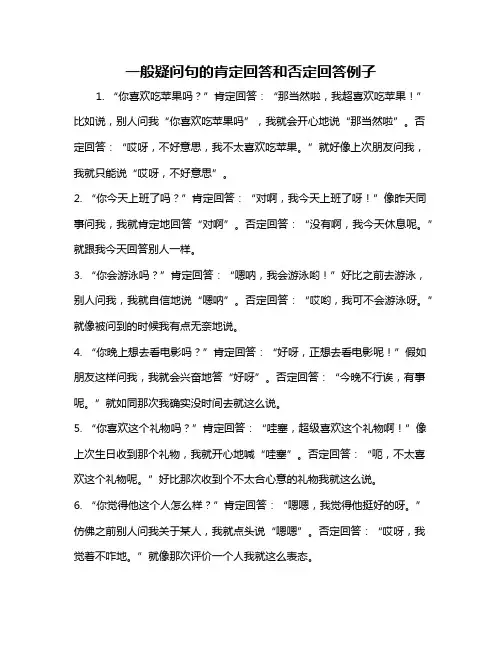
一般疑问句的肯定回答和否定回答例子1. “你喜欢吃苹果吗?”肯定回答:“那当然啦,我超喜欢吃苹果!”比如说,别人问我“你喜欢吃苹果吗”,我就会开心地说“那当然啦”。
否定回答:“哎呀,不好意思,我不太喜欢吃苹果。
”就好像上次朋友问我,我就只能说“哎呀,不好意思”。
2. “你今天上班了吗?”肯定回答:“对啊,我今天上班了呀!”像昨天同事问我,我就肯定地回答“对啊”。
否定回答:“没有啊,我今天休息呢。
”就跟我今天回答别人一样。
3. “你会游泳吗?”肯定回答:“嗯呐,我会游泳哟!”好比之前去游泳,别人问我,我就自信地说“嗯呐”。
否定回答:“哎哟,我可不会游泳呀。
”就像被问到的时候我有点无奈地说。
4. “你晚上想去看电影吗?”肯定回答:“好呀,正想去看电影呢!”假如朋友这样问我,我就会兴奋地答“好呀”。
否定回答:“今晚不行诶,有事呢。
”就如同那次我确实没时间去就这么说。
5. “你喜欢这个礼物吗?”肯定回答:“哇塞,超级喜欢这个礼物啊!”像上次生日收到那个礼物,我就开心地喊“哇塞”。
否定回答:“呃,不太喜欢这个礼物呢。
”好比那次收到个不太合心意的礼物我就这么说。
6. “你觉得他这个人怎么样?”肯定回答:“嗯嗯,我觉得他挺好的呀。
”仿佛之前别人问我关于某人,我就点头说“嗯嗯”。
否定回答:“哎呀,我觉着不咋地。
”就像那次评价一个人我就这么表态。
7. “你能帮我一下吗?”肯定回答:“行啊,没问题,我来帮你!”上次有人这么问我,我就爽快地说“行啊”。
否定回答:“不好意思哈,这会儿没空呢。
”就和那次我有些为难时说的一样。
8. “你养狗了吗?”肯定回答:“养啦,我养了一只超可爱的狗!”就像别人好奇问我时我骄傲地说。
否定回答:“没养呀,还没这个打算呢。
”好像那次我就是这么回应的。
我的观点结论就是:一般疑问句的回答真的很简单直接,有时候一句话就能表达清楚我们的态度和情况呢!。
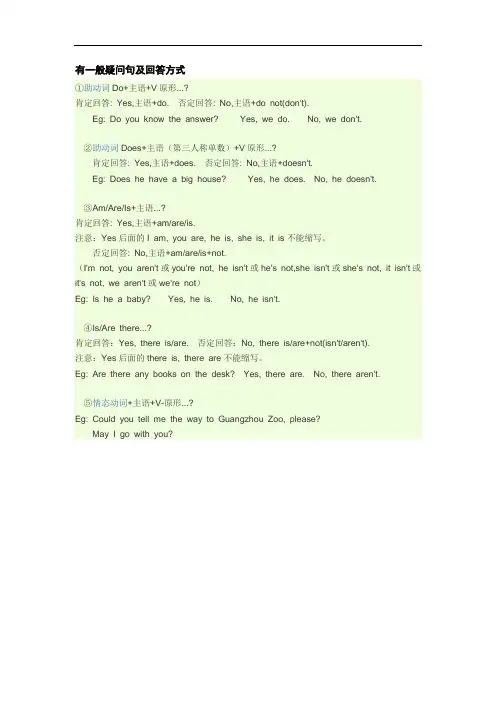
有一般疑问句及回答方式①助动词Do+主语+V原形...?肯定回答: Yes,主语+do. 否定回答: No,主语+do not(don't).Eg: Do you know the answer? Yes, we do. No, we don't.②助动词Does+主语(第三人称单数)+V原形...?肯定回答: Yes,主语+does. 否定回答: No,主语+doesn't.Eg: Does he have a big house? Yes, he does. No, he doesn't.③Am/Are/Is+主语...?肯定回答: Yes,主语+am/are/is.注意:Yes后面的I am, you are, he is, she is, it is不能缩写。
否定回答: No,主语+am/are/is+not.(I'm not, you aren't或you're not, he isn't或he's not,she isn't或she's not, it isn't或it's not, we aren't或we're not)Eg: Is he a baby? Yes, he is. No, he isn't.④Is/Are there...?肯定回答:Yes, there is/are. 否定回答:No, there is/are+not(isn't/aren't).注意:Yes后面的there is, there are不能缩写。
Eg: Are there any books on the desk? Yes, there are. No, there aren't.⑤情态动词+主语+V-原形...?Eg: Could you tell me the way to Guangzhou Zoo, please?May I go with you?。
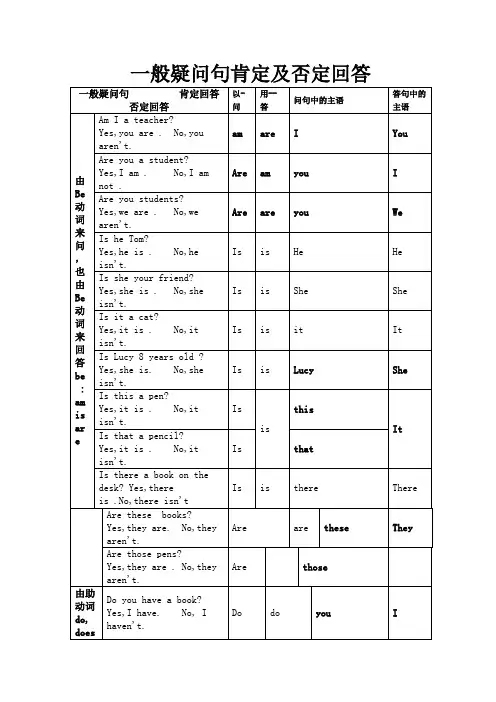
一般疑问句肯定及否定回答一般疑问句 肯定回答否定回答以-问 用--答 问句中的主语答句中的主语由Be动词来问,也由Be动词来回答be:amisar eAm I a teacher? Yes,you are . No,you aren't.am are I YouAre you a student? Yes,I am . No,I am not . Are am you IAre you students? Yes,we are . No,we aren't. Are are you WeIs he Tom? Yes,he is . No,he isn't. Is is He HeIs she your friend? Yes,she is . No,she isn't. Is is She SheIs it a cat? Yes,it is . No,it isn't. Is is it ItIs Lucy 8 years old ? Yes,she is. No,she isn't. Is is Lucy SheIs this a pen? Yes,it is . No,it isn't. Is isthisItIs that a pencil? Yes,it is . No,it isn't.Is thatIs there a book on the desk? Yes,there is .No,there isn'tIs is there ThereAre these books?Yes,they are. No,they aren't.Are are these TheyAre those pens?Yes,they are . No,they aren't.Are those由助动词do,doesDo you have a book?Yes,I have. No, I haven't.Do doyou I,did,will提问,也用它们来回答。

一般疑问句的肯定回答与否定回答Company number:【WTUT-WT88Y-W8BBGB-BWYTT-19998】一般疑问句的肯定回答与否定回答1. 主语一致IsheTomYes,heis.No,heisn’t.Aretheygood friendsYes,theyare.No,theyaren’t.注意①:问句用you,回答改用I或We AreyouJackYes,I am.No,I’m not. AreyouChineseYes,weare.No,wearen’t.注意②:问句用this/that或these/those,回答改用it或theyIsthisyour bookYes,itis.No,itisn’t.Arethoseyour books Yes,theyare.No,theyaren’t.练一练Are you GinaAre those his erasersAre you 12 years oldIs she a good teacherAre these his books含be动词的句子变疑问和否定句变法Be动词包含:am is are 否定句:eg:It is a goat. It is not a goat.You are a teacher. You are not a teacher.总结:含be动词的句子改否定句就是在be动词后面加not疑问句:1一般情况把be动词提前,其余成分照抄2句子中出现I am 或We are 是将它们改成Are you其余成分照抄3句子中出现My 或our时,先将句子改成一般疑问句再将my或our变成your一、将下列句子改为一般疑问句1、This is my handbag.2、That is his pencil.3、It is his house .4、This is your car.5、That is her pen.二、看下列句子做肯定回答和否定回答1、Is this his book2、Is that your watch3、Is it a skirt4、Is he a teacher5、Are you happy三、将下列句子改为否定句1、This is my shirt.2、That is your car.3、He is a doctor.4、It is her dog.5、We are Chinese.。
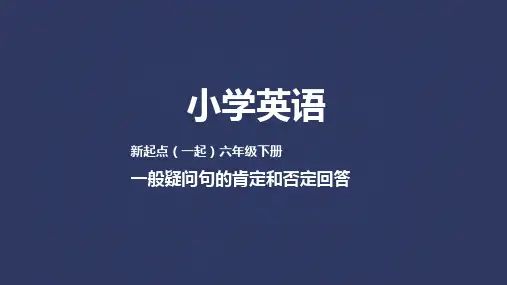
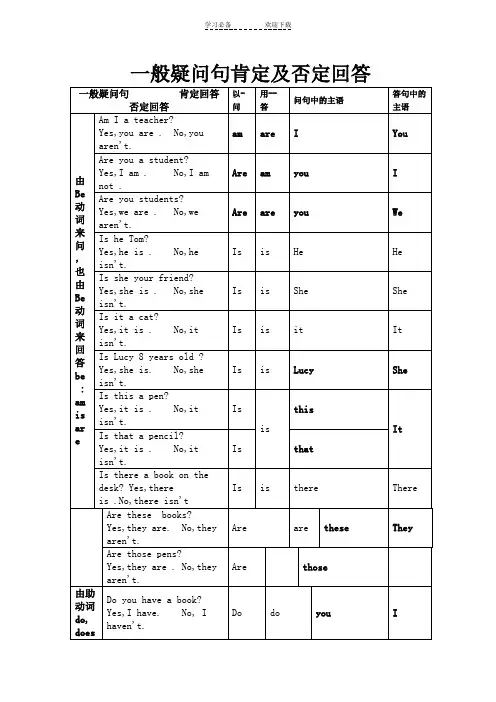
一般疑问句肯定及否定回答一般疑问句 肯定回答否定回答以-问 用--答 问句中的主语答句中的主语由Be动词来问,也由Be动词来回答be:amisar eAm I a teacher? Yes,you are . No,you aren't.am are I YouAre you a student? Yes,I am . No,I am not . Are am you IAre you students? Yes,we are . No,we aren't. Are are you WeIs he Tom? Yes,he is . No,he isn't. Is is He HeIs she your friend? Yes,she is . No,she isn't. Is is She SheIs it a cat? Yes,it is . No,it isn't. Is is it ItIs Lucy 8 years old ? Yes,she is. No,she isn't. Is is Lucy SheIs this a pen? Yes,it is . No,it isn't. Is isthisItIs that a pencil? Yes,it is . No,it isn't.Is thatIs there a book on the desk? Yes,there is .No,there isn'tIs is there ThereAre these books?Yes,they are. No,they aren't.Are are these TheyAre those pens?Yes,they are . No,they aren't.Are those由助动词do,doesDo you have a book?Yes,I have. No, I haven't.Do doyou I,did,will提问,也用它们来回答。
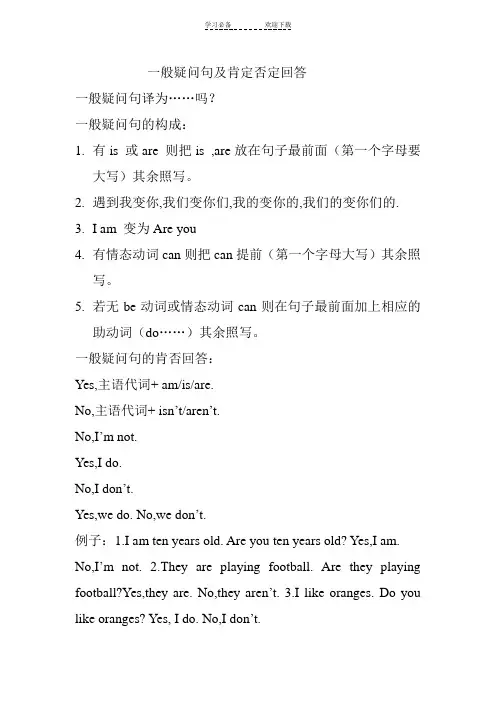
一般疑问句及肯定否定回答
一般疑问句译为……吗?
一般疑问句的构成:
1.有is 或are 则把is ,are放在句子最前面(第一个字母要
大写)其余照写。
2.遇到我变你,我们变你们,我的变你的,我们的变你们的.
3.I am 变为Are you
4.有情态动词can则把can提前(第一个字母大写)其余照
写。
5.若无be动词或情态动词can则在句子最前面加上相应的
助动词(do……)其余照写。
一般疑问句的肯否回答:
Yes,主语代词+ am/is/are.
No,主语代词+ isn’t/aren’t.
No,I’m not.
Yes,I do.
No,I don’t.
Yes,we do. No,we don’t.
例子:1.I am ten years old. Are you ten years old? Yes,I am. No,I’m not. 2.They are playing football. Are they playing football?Yes,they are. No,they aren’t. 3.I like oranges. Do you like oranges? Yes, I do. No,I don’t.。
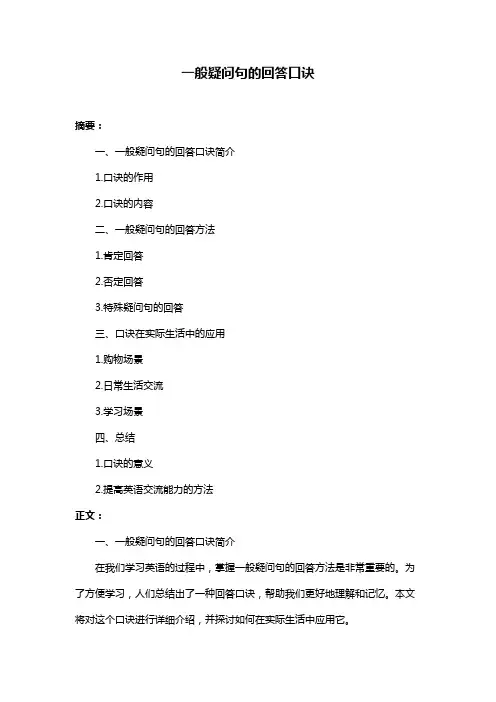
一般疑问句的回答口诀摘要:一、一般疑问句的回答口诀简介1.口诀的作用2.口诀的内容二、一般疑问句的回答方法1.肯定回答2.否定回答3.特殊疑问句的回答三、口诀在实际生活中的应用1.购物场景2.日常生活交流3.学习场景四、总结1.口诀的意义2.提高英语交流能力的方法正文:一、一般疑问句的回答口诀简介在我们学习英语的过程中,掌握一般疑问句的回答方法是非常重要的。
为了方便学习,人们总结出了一种回答口诀,帮助我们更好地理解和记忆。
本文将对这个口诀进行详细介绍,并探讨如何在实际生活中应用它。
二、一般疑问句的回答方法1.肯定回答对于一般疑问句的肯定回答,我们通常需要在句首加上“Yes”,并在末尾加上主格代词“I”或“we”。
例如:- Yes, I am.(是的,我是。
)- Yes, we do.(是的,我们做。
)2.否定回答对于一般疑问句的否定回答,我们通常需要在句首加上“No”,并在末尾加上主格代词“I”或“we”。
例如:- No, I"m not.(不,我不是。
)- No, we don"t.(不,我们不做。
)3.特殊疑问句的回答特殊疑问句的回答通常需要用到疑问词,如:who, what, when, where, why 等。
回答时,需要将这些疑问词与“is/are”、“do”、“did”等助动词搭配使用。
例如:- Who is he?(他是谁?)- He is my friend.(他是我的朋友。
)- What did you do?(你做了什么?)- I played football.(我踢了足球。
)三、口诀在实际生活中的应用1.购物场景在购物时,我们经常会遇到需要用英语交流的情况。
掌握一般疑问句的回答口诀,可以帮助我们更自信地进行沟通。
例如:- Cash or credit card?(现金还是信用卡?)- Cash.(现金。
)- Do you need a bag?(需要袋子吗?)- Yes, please.(是的,谢谢。
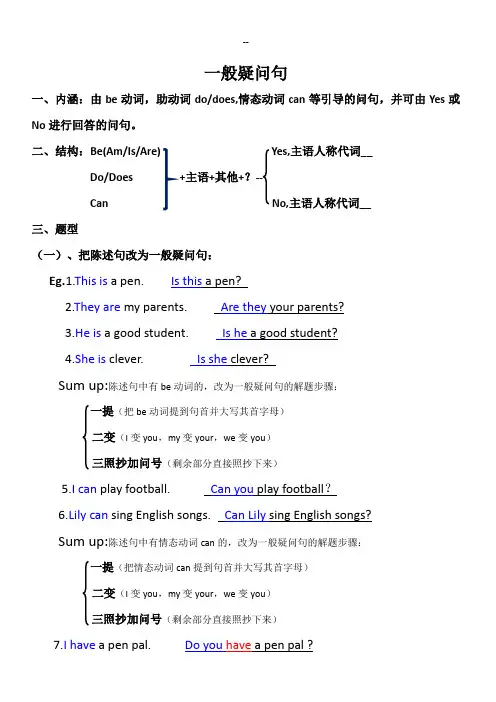
一般疑问句一、内涵:由be动词,助动词do/does,情态动词can等引导的问句,并可由Yes或No进行回答的问句。
二、结构:Be(Am/Is/Are) Yes,主语人称代词__Do/Does +主语+其他+?--Can No,主语人称代词__三、题型(一)、把陈述句改为一般疑问句:Eg.1.This is a pen. Is this a pen?2.They are my parents. Are they your parents?3.He is a good student. Is he a good student?4.She is clever. Is she clever?Sum up:陈述句中有be动词的,改为一般疑问句的解题步骤:一提(把be动词提到句首并大写其首字母)二变(I变you,my变your,we变you)三照抄加问号(剩余部分直接照抄下来)5.I can play football. Can you play football?6.Lily can sing English songs. Can Lily sing English songs?Sum up:陈述句中有情态动词can的,改为一般疑问句的解题步骤:一提(把情态动词can提到句首并大写其首字母)二变(I变you,my变your,we变you)三照抄加问号(剩余部分直接照抄下来)7.I have a pen pal. Do you have a pen pal ?8.He has a soccer ball. Does he have a soccer ball?9.She likes reading storybooks. Does she like reading storybooks?10.Mike wants to be a singer. Does Mike want to be a singer?Sum up:陈述句中有实意动词的(没有be/can),改为一般疑问句的解题步骤:一加(在句首加助动词Do/Does)二变(I变you,my变your,we变you)三照抄加问号(剩余部分直接照抄下来!实意动词要变回原型形式)练习:把下列句子改为一般疑问句。
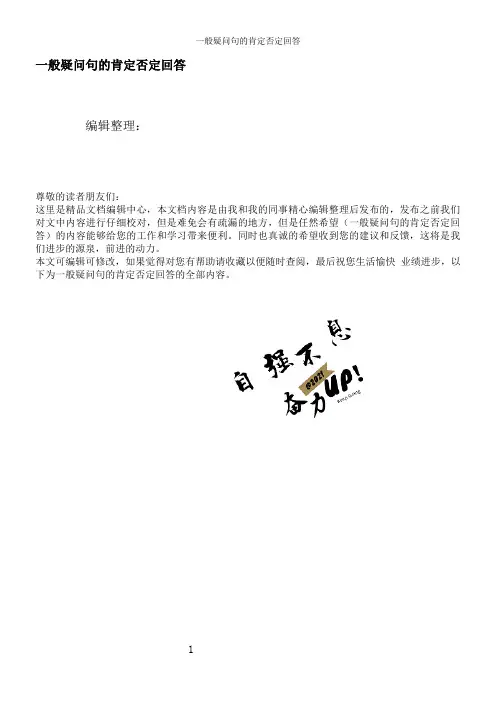
一般疑问句的肯定否定回答编辑整理:尊敬的读者朋友们:这里是精品文档编辑中心,本文档内容是由我和我的同事精心编辑整理后发布的,发布之前我们对文中内容进行仔细校对,但是难免会有疏漏的地方,但是任然希望(一般疑问句的肯定否定回答)的内容能够给您的工作和学习带来便利。
同时也真诚的希望收到您的建议和反馈,这将是我们进步的源泉,前进的动力。
本文可编辑可修改,如果觉得对您有帮助请收藏以便随时查阅,最后祝您生活愉快业绩进步,以下为一般疑问句的肯定否定回答的全部内容。
一般疑问句的肯定否定回答一、注意事项1、人称的变化:I/we/me/us-you,my/our-your;2、借助代词;3、否定缩写形式: be动词+not(is not =isn’t,are not=aren’t,was not =wasn’t,were not =weren’t) 情态动词+not(can not =can’t,could not =couldn’t, should not =shouldn't,must not=mustn’t) 助动词+not(do not=don't,does not=doesn’t, did not=didn’t);4、区分be动词、情态动词和实义动词的不同情况。
二、例题讲解1、Mr.Green is an English teacher.(改成一般疑问句并做肯定、否定回答回答)Is Mr.Green an English teacher? Yes, he is./No,he isn't.(有be动词的,把be动词提前放句首,答句要用代词he替换掉Mr。
Green。
)2、My uncle can teach me Chinese.(改成一般疑问句并做肯定、否定回答)Can your uncle teach you Chinese? Yes, he can./ No, he can’t.(有情态动词的,把情态动词提前放句首,答句要用代词he替换掉your uncle。
亠般疑问句的肯定否定回答—、注意事项1、人称的变化:l/we/me/us —you , my/our —your;2、借助代词;3、否定缩写形式:be动词+not (is not =isn ',are not=aren ',was not =wasn ',were not =weren ')情态动词+not(can not =can', could not =couldn ', should not =shouldn ', must not=mustn')助动词+not (do not=don', does not=doesn', did not=didn ');4、区分be动词、情态动词和实义动词的不同情况。
二、例题讲解1、M r.Green is an English teacher.(改成一般疑问句并做肯定、否定回答回答)Is Mr.Green an English teacher? Yes, he is./No,he isn't.(有be动词的,把be动词提前放句首,答句要用代词he 替换掉Mr.Green。
)2、M y uncle can teach me Chinese.(改成一般疑问句并做肯定、否定回答)Can your uncle teach you Chinese? Yes, he can./ No, he can'. (有情态动词的,把情态动词提前放句首,答句要用代词he 替换掉your uncle。
)3、W e have a lot of books.(改成一般疑问句并做肯定、否定回答)Do you have a lot of books? Yes, we do/No, we don '.(有实义动词的,引入助动词,人称要变化)三、巩固练习1、My school has one hundred teachers.(改成一般疑问句并做肯定回答)2、They are factory workers.(改成一般疑问句并做否定回答)____________________________________ ?,・3、The restaurant has three new cooks.(改成一般疑问句并做肯定回答)____________________________________ ?,・4、Miss Li often writes stories at home.(改成一般疑问句并做肯定回答)____________________________________ ?,・5、I can go to school by bus.(改成一般疑问句并做否定回答)6、She works on the farm.(改成一般疑问句并做肯定回答),・7、Su hai'father could play many kinds of games.(改成般疑问句并做肯定回答)8、My aunt is a nurse in a hospital.(改成一般疑问句并做否定回答)9、That man is a driver.(改成一般疑问句并做否定回答)10、There are some birds in the tree.(改成一般疑问句并做肯定回答)11、There is some milk on the table.(改成一般疑问句并做否定回答)12、Jack'mother often makes nice sweets for us.(改成一般疑问句并做肯定回答)13、The old man always helps sick people. (改成一般疑问句并做肯定回答)14、My brother can cook nice food.(改成般疑问句并做否定回答)?,・15、She'the best writer in America. (改成一般疑问句并做肯定回答)?,・16、My sister likes skating very much. (改成一般疑问句并做肯定回答)?,・17、He s a student at Sunshine Primary school.(改成一般疑问句并做否定回答)?,・18、I love my father and mother.(改成般疑问句并做肯定回答)?,・19、They work at the same hospital. (改成一般疑问句并做否定回答)?20、David had a cold last week.(改成一般疑问句并做否定回答),・21、I did my homework yesterday.(改成一般疑问句并做否定回答)?,・a year ago.(改成一般22、Her parents worked in Nanjing疑问句并做肯疋回答)?。
一般疑问句的肯定回答和否定回答含be动词或情态动词的一般疑问句肯定回答用“Yes,主语+be/情态动词。
”;否定回答用“No,主语+be/情态动词+not.”;be或情态动词和not可用缩写形式。
句子结构一般疑问句有两个家族。
第一家族为含be动词或情态动词的一般疑问句,其结构为:be + 主语 + 其它部分?情态动词 + 主语 + 动词原形 + 其它部分?肯定回答用“Yes,主语+be\情态动词.”,否定回答用“No,主语+be\情态动词+not.”。
be或情态动词和not可用缩写形式,主要有isn’t,aren’t,wasn’t,weren’t,can’t,mustn’t,needn’t等。
Eg1.句: Is this your English book?肯答: Yes,it is.否答: No,it isn’t.Eg2.问句: Are these your English books?肯答: Yes,they are.否答: No,they aren’t.Eg3.问句: Can you speak English?肯答: Yes,I can.否答: No,I can’t.注意例句1和例句2,在回答时必须将this\that与these\those分别变为it和they。
另一家族为含行为动词(或称为实义动词)的一般疑问句,其结构为:助动词 + 主语 + 动词原形 + 其它?肯定回答用“Yes, 主语+ do\does.”,否定回答用“No, 主语+do\does not.”。
助动词也常用缩写形式,主要有don’t,doesn’t,didn’t等。
感谢您的阅读,祝您生活愉快。
一般疑问句的肯定和否定回答1、Is this your pencil-case? 肯定回答:___________________. 否定回答:___________________.2、Is that his backpack?肯定回答:___________________. 否定回答:___________________.3、Are these her brothers?肯定回答:___________________. 否定回答:___________________.4、Are those Tom’s parents? 肯定回答:___________________. 否定回答:___________________.5、Can you play the guitar?肯定回答:___________________. 否定回答:___________________.6、Is this your sister?肯定回答:___________________. 否定回答:___________________.7、Is this my pen?肯定回答:___________________. 否定回答:___________________.8、Do you all(都、全部) at school? 肯定回答:___________________.否定回答:___________________.9、Do they like French fries?肯定回答:___________________.否定回答:___________________. 10、Does he like pears?肯定回答:___________________.否定回答:___________________. 11、Is that a Chinese car?肯定回答:___________________.否定回答:___________________. 12、Can you dance?肯定回答:___________________.否定回答:___________________. 13、Can you paint?肯定回答:___________________.否定回答:___________________. 14、Can she speak English?肯定回答:___________________.否定回答:___________________. 15、Can you speak Chinese?否定回答:___________________.16、Can he play chess?肯定回答:___________________. 否定回答:___________________.17、Is Tim your brother’s name? 肯定回答:___________________. 否定回答:___________________.18、Do you like salad?肯定回答:___________________. 否定回答:___________________.19、Is he your father?肯定回答:___________________. 否定回答:___________________.20、Are you from China?肯定回答:___________________. 否定回答:___________________.21、Does Jason do his homework? 肯定回答:___________________. 否定回答:___________________.22、Are these your grandparents? 肯定回答:___________________.23、Does he often watch TV?肯定回答:___________________.否定回答:___________________.24、Does she want a cup(杯) of coffee(咖啡)? 肯定回答:___________________.否定回答:___________________.25、Do you have many books about English?肯定回答:___________________.否定回答:___________________.26、Is his father an English teacher?肯定回答:___________________.否定回答:___________________.27. Are her grandparents doctors(医生)?肯定回答:___________________.否定回答:___________________.28、Do they have Chinese map?肯定回答:___________________.否定回答:___________________.29、Can you swim?肯定回答: ___________________.否定回答:___________________.。
一般疑问句及肯定否定回答
一般疑问句译为……吗?
一般疑问句的构成:
1.有is 或are 则把is ,are放在句子最前面(第一个字母要
大写)其余照写。
2.遇到我变你,我们变你们,我的变你的,我们的变你们的.
3.I am 变为Are you
4.有情态动词can则把can提前(第一个字母大写)其余照
写。
5.若无be动词或情态动词can则在句子最前面加上相应的
助动词(do……)其余照写。
一般疑问句的肯否回答:
Yes,主语代词+ am/is/are.
No,主语代词+ isn’t/aren’t.
No,I’m not.
Yes,I do.
No,I don’t.
Yes,we do. No,we don’t.
例子:1.I am ten years old. Are you ten years old? Yes,I am. No,I’m not. 2.They are playing football. Are they playing football?Yes,they are. No,they aren’t. 3.I like oranges. Do you like oranges? Yes, I do. No,I don’t.。